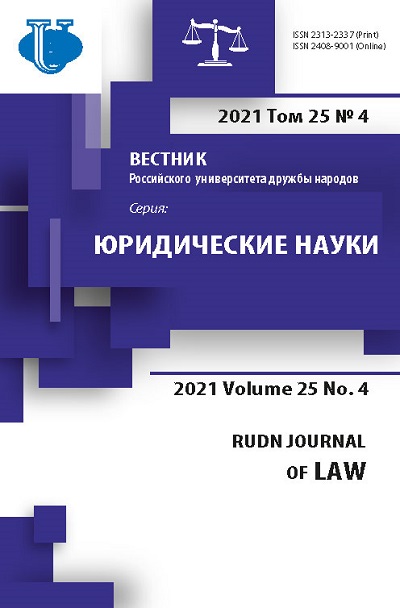High-tech law: concept, genesis and prospects
- Authors: Bertovsky L.V.1
-
Affiliations:
- Peoples’ Friendship University of Russia (RUDN University)
- Issue: Vol 25, No 4 (2021)
- Pages: 735-749
- Section: STATE AND LAW IN CONTEMPORARY WORLD
- URL: https://journals.rudn.ru/law/article/view/29508
- DOI: https://doi.org/10.22363/2313-2337-2021-25-4-735-749
- ID: 29508
Cite item
Full Text
Abstract
Relevance. The article considers the development of law as a regulator of public relations in correlation with emerging and applying various technologies by mankind. In the process of transition from low-tech to high-tech, society has experienced three industrial revolutions and is on the verge of the fourth. The article attempts to establish the stage of modern law development and the degree of its convergence with high technologies. The conclusion is made about the emergence of a new phenomenon - high-tech law, the inner side of which is application of high technologies to solve problems that appear in the process of law enforcement, and the outer side is regulation of public relations arising from their use. The purpose of the work is to substantiate the need for a systematic and evolutionary approach to personnel, technical and regulatory support for further development and functioning of high-tech law and to develop reasonable proposals for solving these problems. The materials for the research were scientific works of specialists in the field of philosophy, legal theory, psychology, technology, statistical data. The author’s experience in organizing training of highly qualified specialists aimed at obtaining a set of competences in the field of law and high technologies has also contributed to this research. Methods. The results and conclusions are obtained on the basis of general scientific research methods: logical, systematic, sociological, as well as private-scientific and special: comparative-legal, formal-legal, interpretation, statistical, and some others. Results. The concept of high-tech law is substantiated and formulated, recommendations for its further technological and regulatory modernization are proposed, and a number of conclusions are made that determine the need to change the process of training legal personnel.
About the authors
Lev V. Bertovsky
Peoples’ Friendship University of Russia (RUDN University)
Author for correspondence.
Email: bgl1980@yandex.ru
ORCID iD: 0000-0002-2835-288X
Doctor of Legal Sciences, Full Professior, Professor of the Department of Criminal Law, Criminal Procedure and Criminalistics, Law Institute
6 Miklukho-Maklaya str., Moscow, 117198, Russian FederationReferences
- Bakhmadov, B.D. (2016) Once again about quality of the higher legal education. Vestnik Chechenskogo gosudarstvennogo universiteta. 3 (23), 111-114. (in Russian)
- Bertovsky, L.V. (2017) Technology blockchain in the criminal process as part of the digital proceedings. Economic Problems and Legal Practice. (6), 226-230. (in Russian)
- Bertovsky, L.V. (2020) The concept of cybercrime. Investigation of crimes: problems and ways to solve them: collection of scientific and practical works. 4 (30), 84-88. (in Russian)
- Engel’s, F. (2019) Origin of the family of private property and the state. Мoscow, Azbuka Publ. (in Russian)
- Gete, I.V. (2006) Faust: tragediya. Translation from German by B.L. Pasternak; comments by N. Vilmont. Moscow, Martin Publ. (in Russian)
- Kurbatova, S.M., Aysner, L.Yu. & Naumkina, V.V. (2020) On the issue of the quality of higher education in the field of training “jurisprudence”. Modern scientist. (6), 145-151. (in Russian)
- Leonenko, N.T. (2015) Legislative technique: textbook. Manual. RANEPA, Siberian Institute of Management-Novosibirsk, SibAGS Publ. (in Russian)
- Nesterov, A.V. (2019) Universal criterion for high-tech level. Competency (Russia). (6), 4-11. (in Russian)
- Reshetnikova, I.V. (2003) Unification of evidence is an inevitable process. EZh-Yurist. 47 (301), 2. Available at: http://base.garant.ru/4083671/ [Accessed 14th March 2021]. (in Russian)
- Rozhkova, M.A. (2020) LegalTech i LawTech - chto eto takoe i v chem ih znachimost’ dlya prava? Zakon.ru. Available at: https://zakon.ru/blog/2020/02/14/legaltech_i_lawtech_-%C2% A0chto_eto_takoe_i_v_chem_ih_znachimost_dlya_prava [Accessed 14th March 2021]
- Salomon, J. (1984) What is Technology? The Issue of its origins and definitions. History of technology. 1 (2), 113-156. https://doi.org/10.1080/07341518408581618
- Snegirev, E.A. (2002) Assessment of Evidence by Inner Belief. Diss... Candidate Legal of sciences. Voronezh. (in Russian)
- Trashkova, S.M. & Aysner, L.Yu. (2017) Complementation of information technologies and educational systems in terms of Russian legislation. Scientific Review: Humanitarian Research. (8-9), 9-11. (in Russian)
- Ushakova, A.P. (2017) How many dissertations are being defended in jurisprudence? (Statistical research). Prologue: Law Journal. (3), 49-55. (in Russian)
- Vlasov, V.I. & Darre, S.I. (2018) Legal education and the problems of its development in modern Russia. Nauka i obrazovanie: khozyaistvo i ekonomika; predprinimatel’stvo; pravo i upravlenie. 7 (98), 58-62. (in Russian)
- Voroshilova, S.V. (2018) About the place of graduate school in higher legal education system. Herald of Omsk University. Series “Law”. 2 (55), 55-58. (in Russian)
Supplementary files















